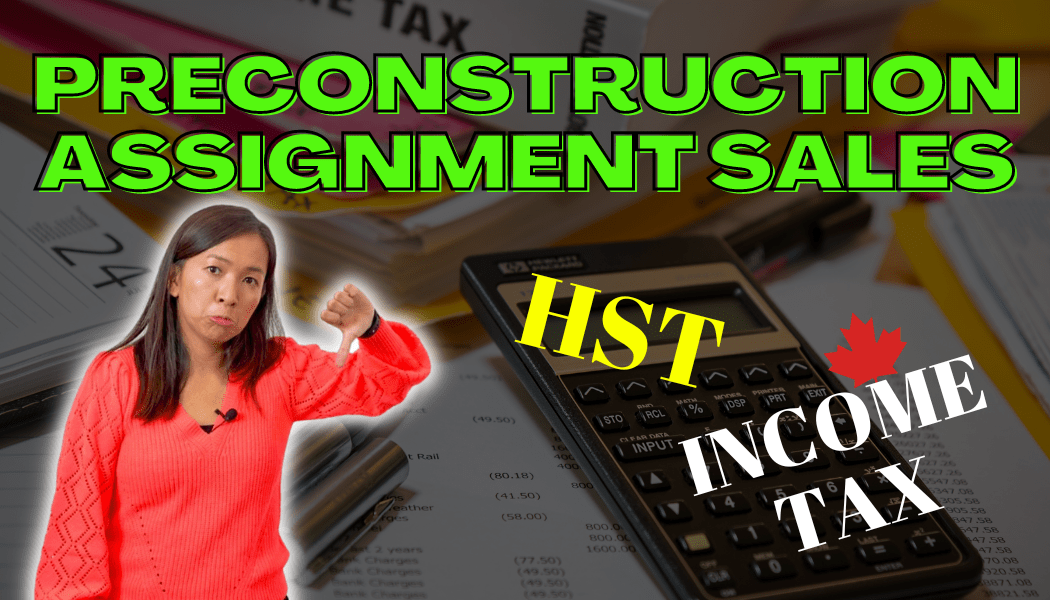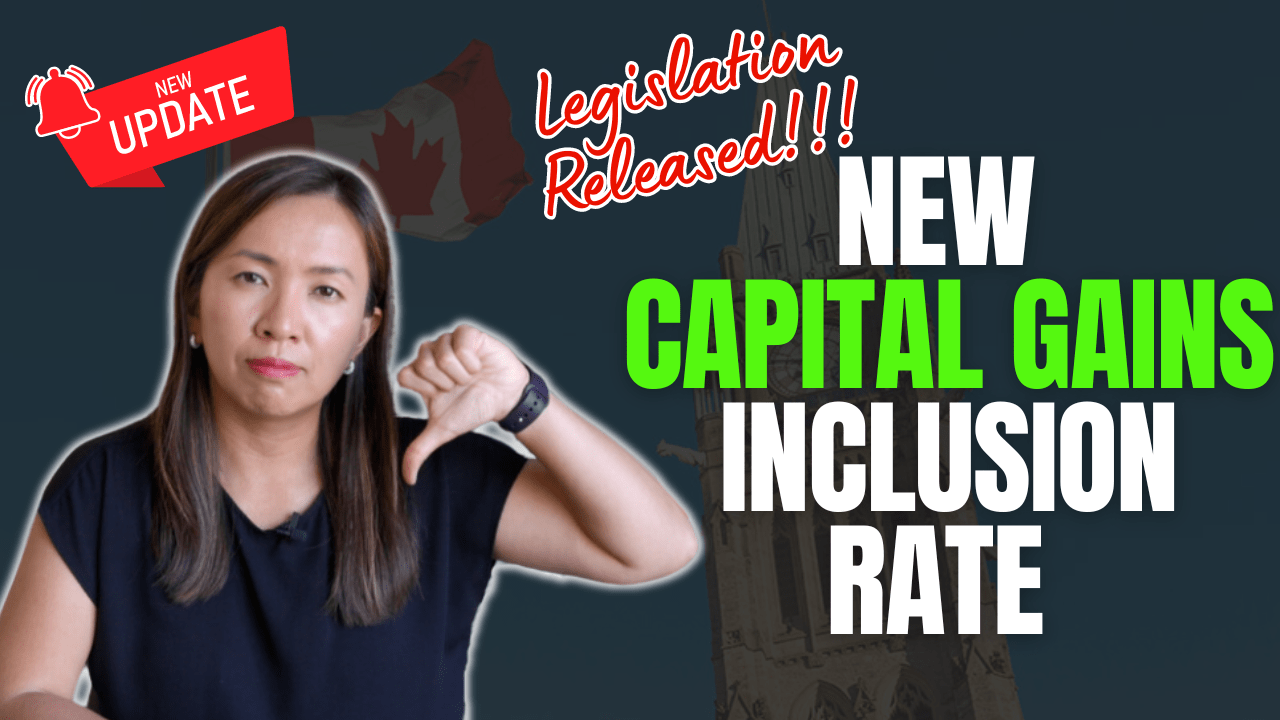Have you sold pre-construction homes before closing on assignments?
Have you wondered about what are the tax implications on selling pre-construction homes before closing?
We often advise our clients to not to sell their pre-construction homes before closing if possible. It can trigger a series of tax implications – HST and income tax implications.
Before the announcement of Budget 2022, CRA had adopted the policies that HST would be applicable on not just the assignment fees, but also the deposit.
This could be a huge tax cost that most investors weren’t aware of.
Now, let’s use an example to explain.
Say you agree to purchase a pre-construction home for $700,000. You sign the agreement of purchase and sale and pay a deposit of $100,000 to the builder.
The new home is expected to be completed a few years later.
You decided to sell the property on assignment before it’s ready for closing for an additional $50,000.
Scenario 1: When you signed the agreement of purchase and sale, you intended to move into the property and use it as your primary residence.
Life circumstances change. You now decided to sell the property before closing. You sold it on assignment before May 6, 2022.
HST: As your intention was to move into the property as your primary residence, you had no HST liability obligation.
Again, intention is subjective. If you’re questioned in court, you would have to provide evidence to prove your own intention.
Most clients thought that the CRA would have to prove that they were wrong. The truth however is that the taxpayers are the one who have the responsibility to prove to CRA their own filing position.
Make sure your have documentation proving your initial intention.
Income Tax: Assuming you have strong documentation proving that you did intend to purchase this pre-construction home as your primary residence, the $50,000 assignment fees could be reported as capital gain.
Scenario 2: When you signed the agreement of purchase and sale, you intended to move into the property and use it as your primary residence.
Life circumstances change. You now decided to sell the property before closing. You sold it on assignment after May 6, 2022.
Budget 2022 changed the rule. For all assignment sales happened after May 6, 2022, regardless of your intention, you’re required to pay HST on the assignment sales.
HST implication:
This means that the $50,000 collected is no longer all yours. This $50,000 collected, if you don’t charge HST on top, is inclusive of HST.
You must remit the HST to CRA on sale on assignment. In this case, it would have been $5.8K.
Presumably, you would also be able to claim Input Tax Credit, which is the HST you paid on services that you used to allow you to sell the property. This includes the HST you paid on your legal cost and HST you paid on brokerage fees.
The net amount can be remitted to CRA.
Income Tax Implication:
Budget 2022 also made some rule changes when it comes down to sale of property. The sale of a property within one year of ownership is considered on income account, meaning 100% of the profit you make is taxable, with some exceptions allowed, effective Jan 1, 2023.
When you apply this new rule to this scenario, it is unknown as to whether an assignment sale is considered a flipped property. It’s difficult to say whether this rule is applicable to assignment sale at this point.
Regardless, you still would need to keep proper and relevant documentation supporting your intention that you were trying to move into the property as your primary residence. With proper documentation, you could still report the net income from assignment sale on capital account, meaning only 50% of the profit you make is taxable.
In our example, assuming client didn’t incur other cost of selling, the client would be reporting $44K of capital gain, 50% of which would be taxable.
Scenario 3: When you signed the agreement of purchase and sale, you intended to rent out your property.
Interest rate changed. You now decided to sell the property before closing. You sold it on assignment before May 6, 2022.
HST implication:
Your intent was never to move into the property as your primary residence or have any of your family members moving in, as a result HST is applicable on assignment sale.
Assignment fees are subject to HST. $50,000 assignment fees you collected are subjected to HST.
CRA also adopted the position that the deposits $100K are also subject to HST as well. Ouch!
You thought you made $50,000 – but after considering the HST on assignment fees $5.8K and HST on deposits $11.5K, you really only net $33K.
This calculation hasn’t considered the brokerage fees as well as the lawyer fees yet. Yikes!
Income Tax implication:
The net amount profit of $33K (assuming there’s no brokerage fees or lawyer fees, if you have, the net profit is lower) would likely have to be reported as income, 100% of it is taxable.
If you own the property in your personal name, the entire amount is added to your job income or whatever income you have in your personal name. You’re taxed at the respective marginal tax rates, which can be as high as 53.5% in Ontario.
Triple Yikes!
If you own the property in the corporation, the profit is taxed as regular business income, most likely at 12.2% for qualified small businesses.
Scenario 4: When you signed the agreement of purchase and sale, you intended to rent out your property.
Interest rate changed. You now decided to sell the property before closing. You sold it on assignment AFTER May 12, 2022.
HST implication:
The Government also recognized that charging HST on deposits were not right. Budget 2022 specified that HST would no longer be charged on deposits.
Assignment fees are subject to HST but deposits are not subject to HST anymore to avoid double taxation.
Assignment fees are reported as income 100% taxable.
So continuing with the same example, HST is applicable on the $50,000 assignment fees, meaning that you would incur HST liability of $5.8K as calculated above.
Again, you could offset the HST liability with the HST you pay on realtor commission as well as lawyer fees on closing.
The net amount would have to be paid to CRA.
Income Tax implication:
The net profit of $44K (assuming there’s no brokerage fees or lawyer fees, if you have, the net profit is lower) would likely have to be reported as income, 100% of it is taxable.
Similar to Scenario 3, if you own the property in your personal name, the entire amount is added to your job income or whatever income you have in your personal name. You’re taxed at the respective marginal tax rates, which can be as high as 53.5% in Ontario.
If you own the property in the corporation, the profit is taxed as regular business income, most likely at 12.2% for qualified small businesses.
Now that we’ve gone through the assignment sales tax implication in details – Are you still planning to sell your properties on assignment?
Let us know below.
Lastly, our team has been working tirelessly to prepare for the upcoming Wealth Hacker Conference on preparing everyone for the upcoming recession. We have experts such as Dalia sharing her insights on how to protect your portfolio and grow from this recession. If you are lost, join us at the upcoming Wealth Hacker Conference.
Visit WealthHacker.ca now to get your tickets.
Until next time, happy Canadian Real Estate Investing.
Cherry Chan, CPA, CA
Your Real Estate Accountant





